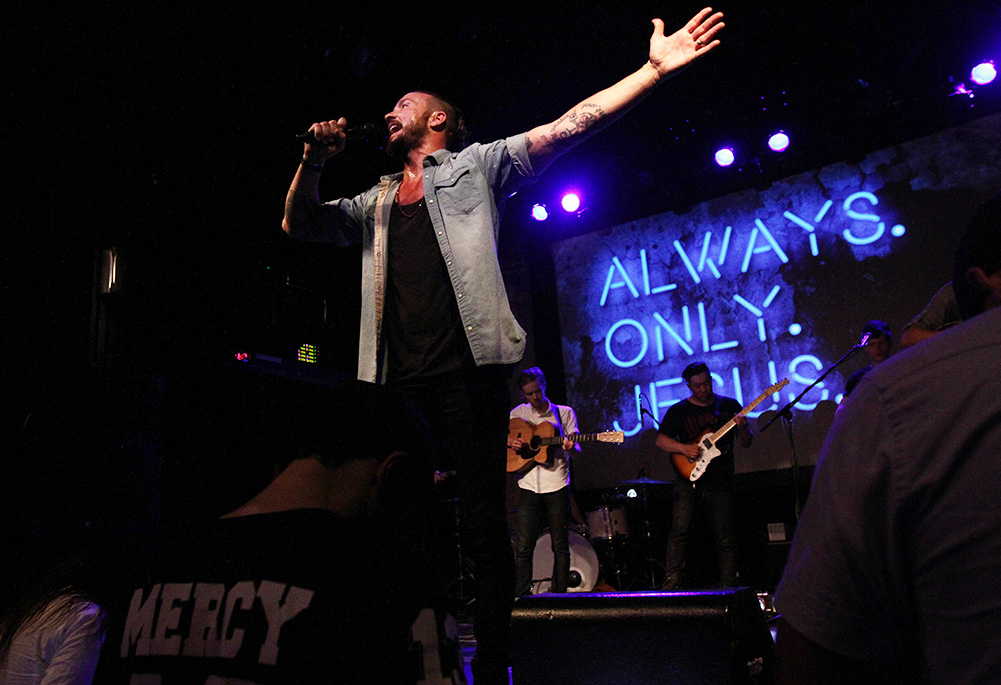
Then-Pastor Carl Lentz leads a Hillsong NYC church service in New York City on July 14, 2013. (AP/Tina Fineberg)
"If you have issues in your life, influence, power and position will exacerbate all of them."
—Carl Lentz, former pastor of Hillsong New York City
There is no better way to sum up the new FX documentary "The Secrets of Hillsong" than the above quote by former Hillsong golden boy himself, Carl Lentz. The series documents the rise and subsequent public downfall of the "influencer pastor," but goes well beyond him too, exposing the abusive and toxic history of the church, beginning with founder Frank Houston and continuing through his son Brian Houston.
The series, which is streaming on Hulu, is the latest chapter in a developing story that encircles the well-known nondenominational congregation, originally founded in Sydney but now a worldwide movement. Last year's "Hillsong: A Megachurch Exposed" on Discovery+ dove into the accusations of child sexual abuse perpetrated by founder Frank Houston, Brian Houston's alleged cover-up of his father's crimes, and how the continued secrecy and hiding of these crimes has caught up with Hillsong in more ways than one.
"The Secrets of Hillsong" is the summary of findings from investigative journalists at Vanity Fair, who in 2021 began developing a story around the very public fall of Carl Lentz after the church fired him in late 2020, and a woman named Ranin Karim publicly said she had had an affair with him. Later in 2021, his children's former nanny accused him of sexual assault. (Lentz has denied her accusations, saying it was a consensual affair.)
As journalists continued digging, that wasn't the end of the problems unearthed.
Their discoveries include: improper use of tithes and offerings, the firing of a gay musician because of his sexual orientation, widespread dismissal of concerns raised by people of color, and a similar dismissal of concerns from members about inappropriate sexual conduct of some Hillsong NYC leaders.
Lentz owns up to the "breach of trust" committed against his wife (whose recounting of the experience is heartbreaking) and children, as well as the thousands of people he pledged to lead. But he can't keep himself from adding that when it comes to violated trust, "Hillsong failed at that, too."
Raised in Virginia Beach, Virginia, Lentz went to Hillsong College in Sydney, where his charismatic personality drew the attention and mentorship of lead pastor Brian Houston. Initially handpicked as an assistant to Houston, Lentz became his protégé and was befriended by his son Joel; together, they were chosen and sent to plant a Hillsong church in New York City.
While living in Sydney, Lentz had met Laura Brett, a local, and they were married in their mid-20s. Viewers begin to see how the relationship would eventually go off the rails when he says, "You kind of think at that stage, getting married is going to fix a lot of the issues in your heart, like your desire to have sex, your desire for other people."
Throughout the documentary, Lentz opens up about his use of prescription drugs as a way to cope with the pressure of exponential growth that Hillsong NYC saw in a short amount of time. While he says early on that he takes responsibility for his mistakes, viewers never hear an apology from him. This feels frustrating, as no one can fully take responsibility without apologizing to the people whom you have hurt.
Advertisement
More sympathetically, Lentz also shares his experience of being sexually abused as a child and never telling anyone, and reflects on the experience of going to rehab after being let go from Hillsong NYC.
"It took me this awful, rock-bottom moment to peel back what sexual abuse does to somebody's brain, in regards to how I handle sex, how I handle truth, how I handle defense systems, how I handle control," he admits onscreen. "I found out at that rehab center that I was a mess inside."
While Lentz is a main character of the first half of the series, the last two episodes look at Hillsong NYC co-founder Brian Houston, who resigned last year in response to his own scandals. In these episodes, we are also told of much larger cover-ups by the global megachurch. Since the firing of Lentz, both the NYC branch and Hillsong Global have become embroiled in constant scandal.
It seems the public firing of Lentz began the unraveling of Hillsong.
And no wonder. Lentz was the golden child of Hillsong, lifted on a pedestal as an example to be emulated. His fame and success at Hillsong NYC propelled him to "Christian influencer" status. He baptized Justin Bieber at 2 a.m. in a bathtub. He hobnobbed with many celebrities, all while giving Christianity a hip look. But is it a look that resembles Jesus of Nazareth?
I'm afraid not. If Jesus came back today to see how Christians have manipulated the Gospel message for their own gain, brand and marketing, I imagine he would step in and overthrow the tables. For the sins and struggles of Hillsong are not unique. Sadly, we see this play out again and again in the wider Christian culture, Catholic spaces included.
The Catholic influencer culture does more harm than good, especially when it creates trauma and exclusion. Because at the end of the day, if we aren't acting more like Jesus, then what are we even doing?
We saw it in Los Angeles Auxiliary Bishop Robert Barron's gross mishandling of accusations of inappropriate behavior of an employee. We see it in female Catholics with large platforms like Leah Darrow who offer personalized coaching to empower Catholic women — for $1,297 per registrant. We've seen it in Matt Fradd convincing his Catholic followers of the need to "reclaim" June from LBGTQA+ people. We see it in U.S. bishops who continue to fail to fully reckon with the evils of clergy sex abuse while enjoying a certain celebrity within the church.
And this is just a small sampling. The Catholic influencer culture does more harm than good, especially when it creates trauma and exclusion. Because at the end of the day, if we aren't acting more like Jesus, then what are we even doing?
If we aren't willing to get uncomfortable, ask hard questions, stand up for justice and for those who feel marginalized — yes, even at the expense of personal popularity — are we even embodying the Gospel message?
Large platforms and followers is not what Jesus will ask us about at our final judgment. Instead he will ask, "Did you try to love me above all things, and did you do your best to love your neighbor as yourself?" Because in the end, that's all that really matters.





